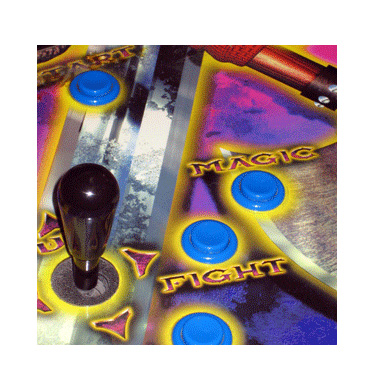


Aquarius was a beautiful pinball machine, an oasis of turquoise and pink, a trippy landscape of mystic symbols and mythic characters among the primary colors and macho themes of games like Extra Inning, Buccaneer and Royal Flush. Not only was Aquarius the prettiest machine in Lee’s Arcade in the summer of 1971, it was the simplest to understand. If you got targets 1 – 12 out, you got a bonus. If you hit the lit-up special number, you got a bonus. Since there were only four digits in the mechanical score counter, scoring increments were 10, 50, 100, 300 at the most – numbers you could add in your head. There were no complicated ball mazes or lifted platforms or additional balls careening into play, and if you dropped into one of the kick-out holes, you could catch your breath for a moment before the ball lazily popped over the rim. Compared to the electronic pinball machines of today, the pace at which the ball rolled across the wide-open playfield was quaint. The bumpers were languorous, the tilt mechanism forgiving: Aquarius was built to take a hip. The various thumps, snaps and bings it emitted during play were not sound effects, but sounds.
Lee’s was located inside Convention Hall, an Italianate red-brick edifice with washed-purple arches and furbelows of creamy stone and antique green. Winged horses rested on tucked hooves over the entry from the boardwalk. Designed by the same architects who did Grand Central Station in Manhattan, Convention Hall still stands on piers over the Atlantic, but Lee’s has been closed for most of the intervening time, decades which have seen the Asbury Park boardwalk plummet almost to extinction. More recently, an involuntary coalition of gay refugees from Provincetown and Fire Island, corrupt politicians, greedy developers, and Bruce Springsteen fans have perked things up a bit, and the long-empty locations of establishments like Lee’s and Mr. Peanut have been filled by an Irish pub, a South Beach-style plein air cocktail lounge, and a cappuccino bar.
Lee’s had the feel of an old-West saloon, with gritty cement floors and smoky air swirling with dust. Even a thirteen-year-old could casually light up indoors then, laying her smoldering butt on the glass top of the machine when it was her turn to play. Skee-Ball and other novelty games lined the three outer walls of the room; back-to-back rows of pinball machines filled the center. All were supervised by hard-to-find, cranky attendants who roved the aisles in canvas aprons, making change from lever-operated coin holders that hung from their belts. The banks of pinball machines squeezed right up to the long line of wooden doors that separated Lee’s from the vast central promenade of Convention Hall. Though glass, these doors gave the feeling of the louvered shutters through which outlaws and lawmen bang into and slam out of a bar.
In fact, Gottlieb’s Sheriff and Lawman were my little sister Nancy’s favorite machines. Eleven years old, tiny, and blonde, my sister was one of the best pinball players in the house, often showing up delinquent local pinball wizards in multi-player contests. She could make Sheriff’s free replay counter pop off like firecrackers on the Fourth of July. To me, Sheriff was hard to play and ugly to boot —gaudy red and yellow, decorated with cowboy cartoons. Aquarius’s backglass featured the signs of the zodiac and the Jungian image of a water carrier, a bald-headed body-builder from whose urn poured a river of life? consciousness? aromatherapy jism? over the toes of a busty nymph. Equally well-endowed blond twins played footsie on nearby rocks; a lion cuddled with a ram, a pair of fish kissed. When the moon is in the seventh house, and Jupiter aligns with Mars... The musical Hair had opened the Age of Aquarius in 1967, but I was only nine then. Now a chubby teenager with poor eyesight and a cute little sister, I had to get there any way I could.
I was no Nancy Winik, but I was good at Aquarius. At three plays for a quarter, I could play for hours with a buck or two, assuming I could find the change guy and pry some quarters out of him. The boost this mastery gave to my dangerously low self-esteem cannot be undone now by the news, discovered in the “comments” section of the Internet Pinball Machine database, ipdb.org (where you can see beautiful photographs of Aquarius and other machines), that Aquarius was probably the easiest-to-beat pinball game ever manufactured. A contributor named revnorb writes, “I'd say that with even minor familiarity with this game, you'd be either totally unskilled or unlucky if you didn't spot all twelve targets at least 50% of the time.” Hamms23 agrees: “you can really get your moneys worth the balls don't drain right away.”
Perhaps I knew this all along; after the initial sting wore off, I could see it made sense. But listen, even by revnorb’s standards, my success with in lighting up those targets proves I was not totally unskilled or unlucky – neither of which seemed out of the realm of possibility at the time. In fact, as Aquarius allowed me to demonstrate, I was a tiny bit skilled and a tiny bit lucky, and actually that has been good enough.

